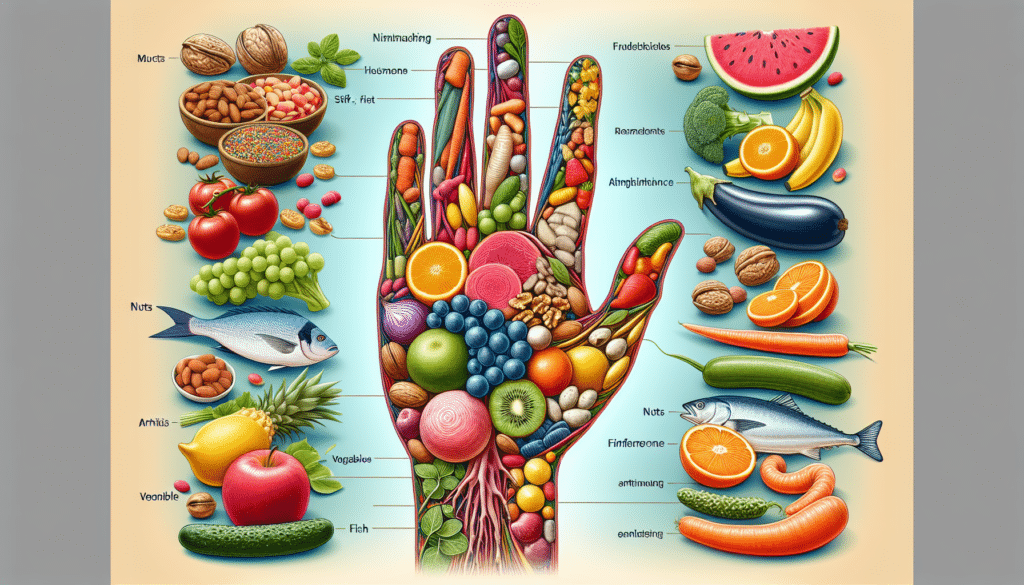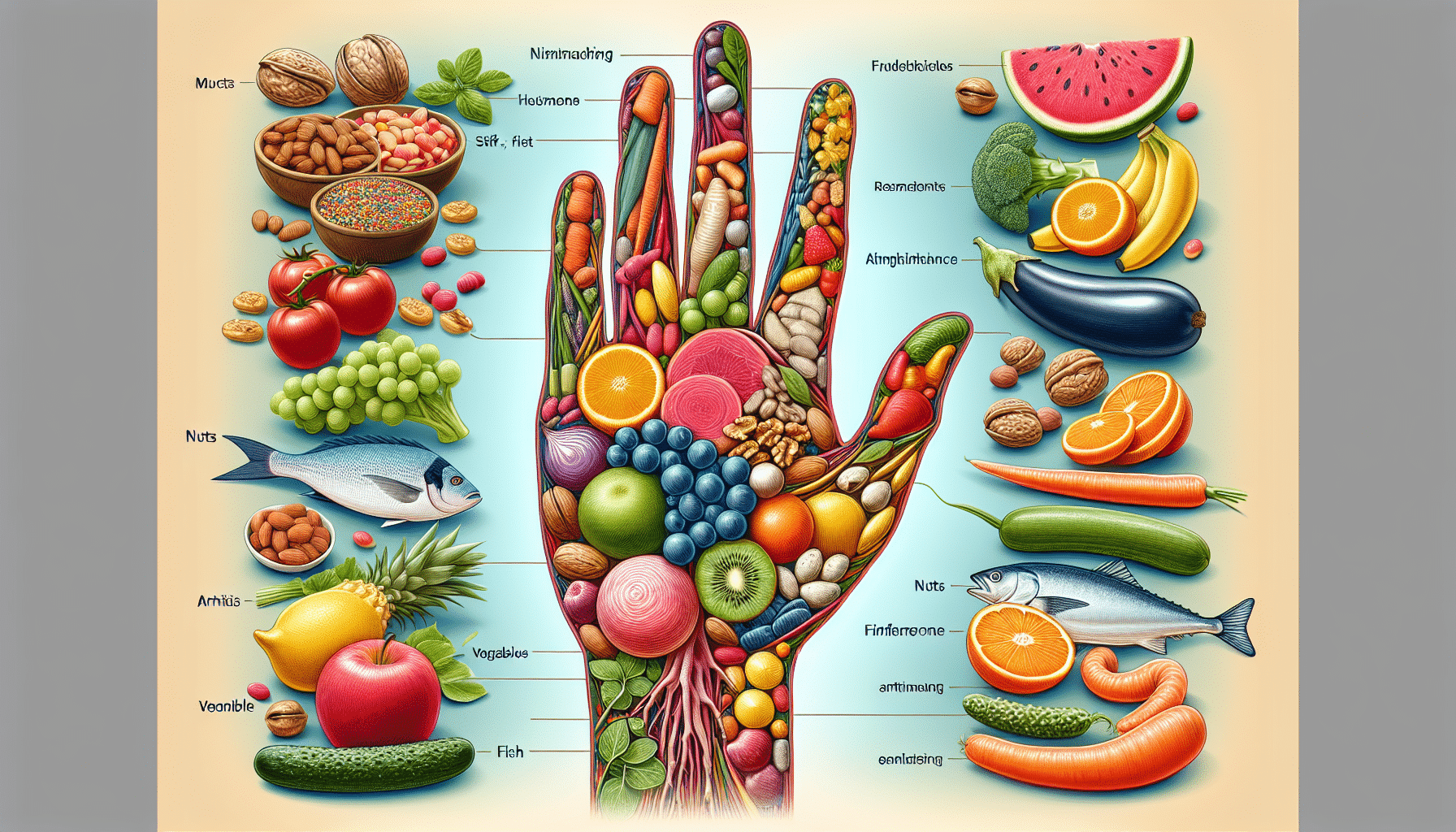
Did you know that nutrition plays a crucial role in managing arthritis inflammation and pain?
It’s true! In this article, we will explore how proper nutrition can help reduce inflammation and alleviate the painful symptoms associated with arthritis.
Understanding the connection between what you eat and how your body responds to arthritis can empower you to make informed choices that can positively impact your overall well-being.
So sit back, relax, and let’s discover the incredible role nutrition can play in managing arthritis.

This image is property of images.pexels.com.
Understanding Arthritis
Arthritis is a common condition that affects millions of people worldwide. It is characterized by inflammation of the joints, causing pain, stiffness, and reduced mobility. There are different types of arthritis, including osteoarthritis, rheumatoid arthritis, and gout, each with their own unique causes and symptoms.
Different types of arthritis
- Osteoarthritis: This is the most common form of arthritis, typically occurring as a result of wear and tear on the joints over time. It commonly affects weight-bearing joints such as the knees, hips, and spine.
- Rheumatoid arthritis: This is an autoimmune disease where the body’s immune system mistakenly attacks the joints, leading to inflammation. It can affect multiple joints and may also cause systemic symptoms.
- Gout: Gout is caused by a buildup of uric acid crystals in the joints. It often affects the big toe but can also impact other joints such as the knees, ankles, and wrists.
Causes of arthritis inflammation and pain
Arthritis inflammation and pain can be caused by a variety of factors. In osteoarthritis, the breakdown of cartilage in the joints leads to friction and inflammation.
In rheumatoid arthritis, the immune system attacks the joints, causing inflammation.
Gout is triggered by high levels of uric acid in the blood, leading to the formation of crystals in the joints.
The impact of arthritis on daily life
Living with arthritis can have a significant impact on daily life. The pain, stiffness, and reduced mobility associated with arthritis can make it challenging to perform everyday tasks and activities.
Simple actions like opening a jar or climbing stairs can become difficult, leading to decreased independence and quality of life.
Understanding and managing arthritis is crucial for maintaining overall well-being and minimising its impact on daily activities.
The Connection Between Nutrition and Arthritis
Proper nutrition plays a vital role in managing inflammation and pain associated with arthritis. The food we consume can either contribute to or help reduce inflammation in the body. By making mindful dietary choices, you can positively influence your arthritis symptoms and overall joint health.
Dietary factors that contribute to arthritis inflammation
Certain dietary factors have been linked to increased inflammation in the body, worsening arthritis symptoms. These include foods high in saturated and trans fats, refined sugars, and processed meats.
Consuming these types of foods on a regular basis can promote inflammation and contribute to the progression of arthritis.
The role of nutrition in managing arthritis inflammation
On the other hand, a healthy diet rich in fruits, vegetables, whole grains, lean proteins, and healthy fats can help manage inflammation associated with arthritis.
Such a diet provides essential nutrients that support the body’s immune system and reduce inflammatory markers.
Impact of nutrition on arthritis pain
In addition to managing inflammation, certain nutrients have been shown to have a direct impact on arthritis pain.
For example, omega-3 fatty acids found in fatty fish like salmon and mackerel have been shown to reduce joint pain and stiffness.
Antioxidants, found in foods such as berries and leafy greens, can also help alleviate pain and protect against further damage caused by inflammation.

This image is property of images.pexels.com.
Anti-Inflammatory Foods for Arthritis Management
Adopting an anti-inflammatory diet can play a crucial role in managing arthritis symptoms. This type of diet focuses on consuming foods that have been shown to reduce inflammation in the body and promote overall joint health.
Benefits of an anti-inflammatory diet
An anti-inflammatory diet provides several benefits for individuals with arthritis. It can help reduce pain, swelling, and stiffness in the joints, improve mobility, and enhance overall well-being. Additionally, this type of diet can help maintain a healthy weight, which is important for minimiszing stress on the joints.
Key nutrients for reducing arthritis inflammation
Several key nutrients have been identified for their anti-inflammatory properties. Omega-3 fatty acids, found in fatty fish, flaxseeds, and walnuts, have been extensively studied for their ability to reduce inflammation.
Curcumin, a compound found in turmeric, has also shown promise in reducing inflammation and alleviating arthritis symptoms. Other nutrients, such as vitamins C and E, selenium, and zinc, are also known for their anti-inflammatory effects.
Foods to include in an anti-inflammatory diet
Incorporating anti-inflammatory foods into your diet is a simple yet effective way to manage arthritis inflammation. Include a variety of colourful fruits and vegetables, such as berries, leafy greens, and cruciferous vegetables, as they are packed with vitamins, minerals, and antioxidants.
Whole grains, such as brown rice and quinoa, provide fibre and complex carbohydrates, which can help maintain stable blood sugar levels and reduce inflammation. Lean proteins, including fish, poultry, and legumes, provide essential amino acids for tissue repair and inflammation control.
Don’t forget about healthy fats like olive oil, avocados, and nuts, which contain monounsaturated fats and omega-3 fatty acids.
Omega-3 Fatty Acids for Arthritis Relief
Omega-3 fatty acids have gained significant attention for their potential benefits in managing arthritis inflammation and providing relief from pain and stiffness.
The role of omega-3 fatty acids in managing arthritis
Omega-3 fatty acids are polyunsaturated fats that have been shown to have anti-inflammatory properties. They can help reduce the production of inflammatory substances in the body, such as prostaglandins and leukotrienes, which contribute to arthritis inflammation and pain.
Including omega-3 fatty acids in your diet can help modulate the inflammatory response and potentially decrease the severity of arthritis symptoms.
Sources of omega-3 fatty acids
There are several dietary sources of omega-3 fatty acids. Fatty fish, such as salmon, mackerel, and sardines, are excellent sources. Other sources include flaxseeds, chia seeds, walnuts, and soybeans.
If you’re unable to obtain sufficient omega-3s from your diet, supplements such as fish oil capsules or algae-derived omega-3 supplements can be considered as well. However, it’s always best to consult with a healthcare professional before starting any supplementation.
Recommended omega-3 intake for arthritis patients
The recommended daily intake of omega-3 fatty acids varies depending on age, sex, and overall health. In general, it is recommended to consume at least 250-500 milligrams of combined EPA and DHA (the two main types of omega-3s) per day.
However, for individuals with arthritis, higher doses may be beneficial. Consult with a healthcare professional to determine the appropriate omega-3 intake for your specific needs.

This image is property of images.pexels.com.
Anti-Oxidant Rich Foods for Arthritis
Antioxidants are compounds that help neutralise harmful free radicals in the body, which can contribute to inflammation and tissue damage. Including antioxidant-rich foods in your diet can be beneficial in managing arthritis symptoms and promoting overall joint health.
The importance of antioxidants in arthritis management
Arthritis is associated with increased oxidative stress and damage caused by free radicals. Antioxidants play a crucial role in combating this oxidative stress and protecting joint tissues from further damage. By reducing inflammation and neutralising free radicals, antioxidants can help alleviate pain and slow down the progression of arthritis.
Top antioxidant-rich foods for arthritis relief
Numerous foods are rich in antioxidants and can provide relief for individuals with arthritis. Berries, such as strawberries, blueberries, and raspberries, are particularly high in antioxidants. Dark leafy greens, such as spinach and kale, are also excellent sources.
Colourful vegetables, including bell peppers, tomatoes, and sweet potatoes, are packed with antioxidants. Other foods, such as nuts, seeds, and green tea, can also provide a significant antioxidant boost.
Incorporating antioxidant-rich foods into the diet
Including antioxidant-rich foods in your daily diet is a simple and enjoyable way to manage arthritis symptoms. Add a variety of berries to your breakfast routine or enjoy a colorful salad filled with leafy greens and vibrant vegetables at lunchtime. Snack on a handful of nuts and seeds throughout the day, and consider replacing sugary beverages with antioxidant-rich green tea. By making these small yet impactful dietary changes, you can improve your overall joint health and manage arthritis inflammation.
The Role of Vitamins and Minerals in Arthritis Inflammation
Vitamins and minerals are essential nutrients that play a vital role in overall health, including managing arthritis inflammation. The adequate intake of specific vitamins and minerals can help reduce inflammation, support joint health, and improve overall well-being.
Vitamin D and its effect on arthritis inflammation
Vitamin D has emerged as a critical nutrient in managing arthritis inflammation. It plays a role in regulating the immune system and can help reduce the production of inflammatory cytokines. Additionally, vitamin D deficiency has been associated with increased disease severity in certain types of arthritis, such as rheumatoid arthritis. Getting adequate sunlight exposure or considering vitamin D supplementation can be beneficial for individuals with arthritis.
Other essential vitamins and minerals for arthritis management
Several other vitamins and minerals have been studied for their potential benefits in arthritis management. Vitamin C, for example, is known for its antioxidant properties and has been shown to reduce the risk of developing inflammatory arthritis. Vitamin E, selenium, and zinc also have antioxidant and anti-inflammatory effects that can help manage arthritis symptoms. It is important to ensure a well-rounded diet that includes a variety of fruits, vegetables, nuts, and seeds to obtain these essential vitamins and minerals.
Supplementing vitamins and minerals for better arthritis control
While getting nutrients from whole foods is always preferred, certain circumstances may warrant the need for supplements. If you have a deficiency or are unable to obtain sufficient amounts of specific vitamins and minerals through your diet alone, supplements can be an option. It’s crucial to consult with a healthcare professional before starting any supplementation to determine the appropriate dosage and assess any potential interactions with medications.

The Gut-Arthritis Connection
The gut microbiome, consisting of trillions of bacteria living in our digestive system, has a profound impact on our overall health.
In recent years, the connection between gut health and arthritis inflammation has gained attention, highlighting the importance of a healthy gut for managing arthritis symptoms.
Understanding the gut microbiome
The gut microbiome refers to the diverse community of bacteria, fungi, viruses, and other microorganisms that reside in our gastrointestinal tract. It plays a crucial role in various aspects of our health, including digestion, nutrient absorption, immune function, and even mental health.
The composition and diversity of the gut microbiome can vary significantly from person to person and can be influenced by numerous factors, including diet, medications, and lifestyle.
The link between gut health and arthritis inflammation
Emerging research suggests that an imbalance in the gut microbiome, known as dysbiosis, may contribute to the development and progression of arthritis.
Dysbiosis can lead to increased intestinal permeability or “leaky gut,” allowing harmful substances to enter the bloodstream and trigger an immune response.
This immune response can contribute to systemic inflammation, potentially exacerbating arthritis symptoms.
Probiotics and prebiotics for gut health improvement
Probiotics are beneficial bacteria that can help restore and maintain a healthy gut microbiome. They can be found in certain fermented foods, such as yogurt, sauerkraut, and kimchi, or taken as supplements.
Prebiotics, on the other hand, are types of dietary fibre that feed the beneficial bacteria in the gut, promoting their growth and activity.
Foods rich in prebiotics include garlic, onions, bananas, and whole grains. Including probiotics and prebiotics in your diet can support a healthy gut microbiome and potentially alleviate arthritis inflammation.
The Impact of Weight Management on Arthritis
Maintaining a healthy weight is essential for managing arthritis inflammation and minimising pain.
Excess weight puts additional stress on the joints, particularly the weight-bearing ones, leading to increased inflammation and accelerated joint degeneration.
Effects of excess weight on arthritis inflammation and pain
Carrying excess weight can significantly worsen arthritis symptoms. The additional weight places more pressure on the joints, causing increased friction and inflammation.
This can lead to more pain, stiffness, and reduced mobility. Weight management is crucial for relieving this burden and reducing the progression of arthritis.
Importance of a balanced diet for weight management
A balanced diet is key to achieving and maintaining a healthy weight. It involves consuming an appropriate number of calories for your activity level and ensuring you are getting all the necessary nutrients.
A balanced diet should include a variety of fruits, vegetables, whole grains, lean proteins, and healthy fats. Additionally, portion control and mindful eating can help prevent overeating and support weight management.
Lifestyle changes to support weight loss
In addition to a balanced diet, lifestyle changes can support weight loss and help manage arthritis symptoms. Regular physical activity is essential for weight management and joint health.
Low-impact exercises such as swimming, walking, or cycling can be beneficial for individuals with arthritis. Additionally, managing stress levels and getting adequate sleep are important factors in supporting overall well-being and maintaining a healthy weight.

The Role of Hydration in Arthritis Management
Proper hydration is often overlooked but is crucial for overall health, including joint health. Staying well-hydrated can help ensure the proper functioning of your joints and minimize arthritis symptoms.
Importance of hydration for joint health
Water is essential for maintaining the integrity of joint tissues and facilitating proper lubrication.
Hydration helps keep the joints well-nourished and allows them to move smoothly without friction. Additionally, water helps transport essential nutrients and oxygen to the joints while carrying away waste products and toxins. Without adequate hydration, joint function and overall well-being can be compromised.
How water consumption affects arthritis symptoms
Staying hydrated can have a direct impact on arthritis symptoms. Sufficient water intake helps keep joints lubricated and can reduce stiffness and pain. Inadequate hydration, on the other hand, can lead to dehydration, which can exacerbate inflammation and increase discomfort for individuals with arthritis. It is essential to prioritize hydration to support joint health and manage arthritis symptoms.
Other fluids and their impact on arthritis pain
While water is the best choice for hydration, certain fluids can have additional benefits for managing arthritis pain. For example, herbal teas, such as ginger or turmeric tea, can provide anti-inflammatory properties.
Tart cherry juice has been shown to reduce joint pain and inflammation in some individuals. However, it’s important to be mindful of added sugars and caffeine in certain beverages, as these can have negative effects on arthritis symptoms.
Conclusion
In conclusion, nutrition plays a crucial role in managing arthritis inflammation and pain.
By making mindful dietary choices and incorporating specific foods and nutrients into your diet, you can support joint health and alleviate the symptoms associated with arthritis. An anti-inflammatory diet rich in fruits, vegetables, whole grains, lean proteins, and healthy fats can help manage inflammation and provide relief from pain.
Omega-3 fatty acids, antioxidants, vitamins, and minerals all have unique properties that can contribute to better arthritis control.
Additionally, maintaining a healthy weight, supporting gut health, and ensuring proper hydration are essential factors in managing arthritis symptoms and improving overall well-being.
By taking a holistic approach to nutrition and lifestyle, you can empower yourself to effectively manage arthritis and optimise your quality of life.







